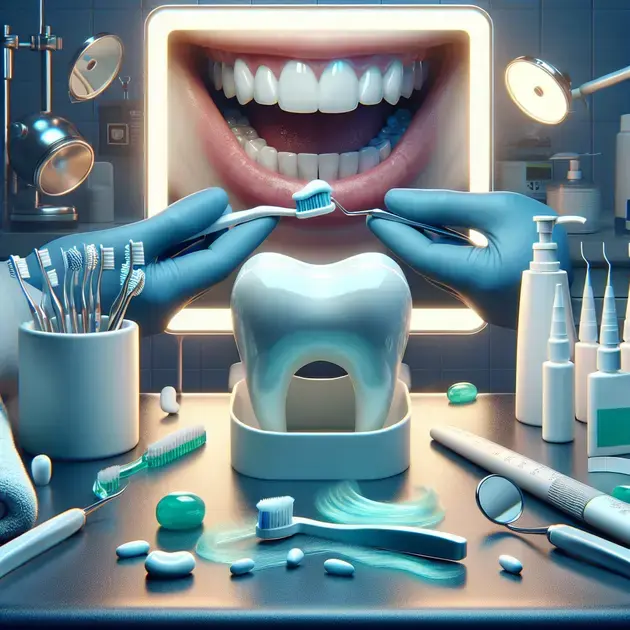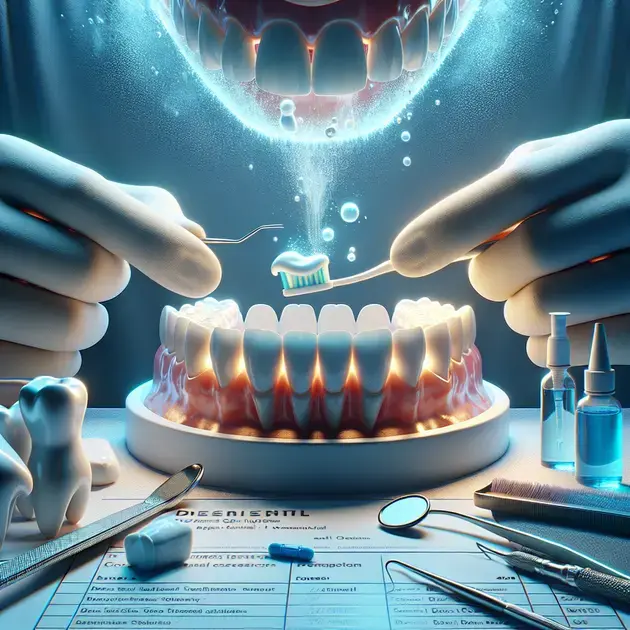Tooth decay, a common dental issue affecting many individuals, can have a significant impact on oral health. Understanding how tooth decay develops is crucial in preventing potential dental problems. From the initial stages of plaque formation to the demineralization of enamel, this article delves into the various factors that contribute to the development of tooth decay. By exploring these key aspects, readers can gain valuable insights into maintaining optimal oral hygiene and preventing dental decay.

What Causes Tooth Decay?
Tooth decay is primarily caused by plaque buildup on the teeth. Plaque is a sticky film of bacteria that forms on teeth and feeds on sugars from the food we eat. These bacteria produce acids that attack the enamel, leading to tooth decay. Poor oral hygiene, sugary foods and drinks, and irregular dental check-ups can all contribute to tooth decay.
To prevent tooth decay, it’s essential to maintain good oral hygiene practices. Brushing your teeth twice a day with a fluoride toothpaste, flossing daily, and avoiding excessive consumption of sugary treats can help reduce the risk of decay. Additionally, regular visits to the dentist for cleanings and check-ups are crucial in preventing tooth decay.
Understanding the causes of tooth decay can help individuals make informed decisions about their oral health. By adopting healthy habits and seeking professional dental care, it is possible to prevent and even reverse early stages of tooth decay.
Preventing Tooth Decay
Preventing tooth decay starts with establishing a proper oral hygiene routine. Brushing your teeth for two minutes, twice a day, using fluoridated toothpaste is crucial in removing plaque and preventing decay. Flossing daily also helps clean areas between teeth where a toothbrush can’t reach.
Incorporating a balanced diet rich in fruits, vegetables, and lean proteins while limiting sugary and acidic foods can also play a significant role in preventing tooth decay. Drinking water and chewing sugar-free gum after meals can help stimulate saliva production, which naturally cleanses the mouth.
Understanding the Stages of Tooth Decay
Tooth decay progresses through various stages, starting with the formation of a cavity on the tooth’s surface. As the decay advances, it can reach the inner layers of the tooth, causing pain and sensitivity. If left untreated, tooth decay can lead to infection and the eventual loss of the tooth.
Dental professionals use different diagnostic tools, such as X-rays and visual exams, to identify the stages of tooth decay accurately. Early-stage decay can often be treated with fluoride treatments or dental fillings, while advanced decay may require more extensive interventions like root canals or extractions.

The Importance of Oral Hygiene
Oral hygiene plays a crucial role in maintaining overall health, especially in preventing common dental issues such as tooth decay. Proper oral hygiene practices, including regular brushing, flossing, and dental check-ups, can significantly reduce the risk of tooth decay and other oral diseases. Tooth decay occurs when plaque, a sticky film of bacteria, forms on teeth and produces acids that attack tooth enamel over time, leading to cavities.
By following a strict oral hygiene routine, individuals can effectively remove plaque and prevent the accumulation of harmful bacteria in the mouth. Brushing teeth at least twice a day with fluoride toothpaste and flossing daily can help eliminate food particles and bacteria that contribute to tooth decay. Additionally, using mouthwash can further reduce bacteria levels and promote a healthier oral environment.
Regular visits to the dentist for professional cleanings and check-ups are essential for maintaining good oral health and preventing tooth decay. Dentists can identify early signs of cavities or other dental issues and provide necessary treatments to prevent further decay. Furthermore, dentists can offer guidance on proper oral hygiene practices and recommend specific products to help combat tooth decay.
Ultimately, prioritizing oral hygiene is key to preventing tooth decay and ensuring a healthier smile. By adopting good oral care habits and seeking professional dental care, individuals can safeguard their teeth from decay and maintain a strong, beautiful smile for years to come.
Healthy Habits for a Stronger Smile
Incorporating healthy habits into your daily routine is essential for promoting a stronger smile and preventing tooth decay. A balanced diet rich in nutrients, including calcium and vitamin D, is crucial for maintaining strong teeth and bones. Consuming sugary and acidic foods and beverages in moderation can help reduce the risk of tooth decay and enamel erosion.
Aside from dietary choices, practicing good oral hygiene habits is paramount for a healthy smile. Brushing and flossing regularly, along with using fluoride toothpaste and mouthwash, can help remove plaque and bacteria that cause tooth decay. It’s also advisable to replace toothbrushes every three to four months and to schedule routine dental check-ups to monitor oral health.
Avoiding harmful habits such as smoking and excessive alcohol consumption is also beneficial for overall oral health. These behaviors can contribute to gum disease, tooth decay, and other oral issues that compromise the strength and appearance of your smile. By prioritizing oral hygiene and adopting healthy lifestyle choices, you can protect your teeth from decay and maintain a radiant smile.
Remember, prevention is key when it comes to tooth decay. By making informed choices and adhering to a dental care regimen, you can pave the way for a healthier, stronger smile and minimize the risk of dental complications in the future.
Common Myths About Cavities
Despite advancements in dental care and oral health education, several myths about cavities continue to circulate. One common misconception is that sugar is the sole cause of tooth decay. While consuming sugary foods and beverages can contribute to cavity formation, the presence of bacteria in the mouth plays a more significant role in the development of cavities.
Another prevalent myth is that cavities only affect children. In reality, individuals of all ages are susceptible to tooth decay, particularly if proper oral hygiene practices are not followed. Poor brushing and flossing habits, along with a diet high in sugar and carbohydrates, can increase the likelihood of cavities in adults as well as children.
Additionally, some people believe that pain is always present when a cavity is present. However, early-stage cavities may not cause discomfort initially, making it essential to attend regular dental check-ups for early detection. Dentists can identify and treat cavities before they progress and cause pain or more extensive damage to the teeth.
It’s crucial to dispel these myths about cavities and prioritize preventive measures to combat tooth decay effectively. By understanding the true causes of cavities, maintaining good oral hygiene practices, and seeking professional dental care, individuals can protect their teeth from decay and preserve their oral health for the long term.
Conclusion
In summary, understanding the primary causes of tooth decay and the importance of oral hygiene is crucial for maintaining optimal dental health. Plaque buildup, fueled by sugars and poor oral hygiene practices, plays a significant role in the development of cavities. By implementing a robust oral care routine, including regular brushing, flossing, and dental check-ups, individuals can effectively combat tooth decay and prevent associated oral diseases.
Preventing tooth decay requires a multi-faceted approach, encompassing healthy dietary choices, consistent oral hygiene habits, and professional dental care. By prioritizing preventive measures and dispelling common myths about cavities, individuals can safeguard their teeth from decay and preserve their oral health for the long term. Remember, early detection and intervention are key in addressing tooth decay at various stages and maintaining a healthy, radiant smile.
By adopting a balanced approach to oral health, incorporating beneficial habits into daily routines, and seeking professional guidance when needed, individuals can take proactive steps towards preventing tooth decay and ensuring a strong, beautiful smile for years to come. Prioritizing oral hygiene is not just about maintaining a perfect smile but also about promoting overall well-being and confidence in one’s oral health. Stay informed, proactive, and committed to your oral care regimen to enjoy lasting dental health and a confident smile.